By Freddy Gelati-Meinert
Director: Feng Xiaogang
Feng Xiaogang’s films are not just films, they are cultural events. Famed for repeatedly directing the blockbusters which China sits down to in their collective 1.3 billion to ring in the new year (known in Chinese as the hesuipian, or ‘New Year Film’), he is, in a way, China’s greatest director.
As I Am Not Madame Bovary, his 2016 film which is currently distributing in the UK, makes clear, however, he has lost the edge he once had. Gone is the acerbic social commentary of Big Shot’s Funeral, in which a disillusioned dying American studio director (Donald Sutherland) asks a dopey cameraman (the comic star Ge You) to give him a ‘comedy funeral’. Nor does it have the subtly biting form of criticism found in Aftershock of official corruption preceding the 2008 Sichuan earthquake, in which thousands of children were negligently killed by officials who siphoned money into their own coffers rather than invest in earthquake-proofing for local schools.
The film, an adaptation of Liu Zhenyun’s book of the same name, is a comedy-drama centred on the injustice faced by one Li Xuelian, a woman who single-handedly takes a divorce case from a rural village in Jiangxi all the way to Beijing, attracting the attention of the top brass.
Sadly, cloaked under the guise of sociopolitical critique, I Am Not Madame Bovary becomes the precise opposite of that. The film begins as an exposition of a sexist and corrupt official bureaucracy, but develops into a clunky and plodding panegyric to the upper echelons of the party whilst admonishing hapless minor officials.
In scene after trudging scene (the film is a totally unnecessary 2 hours and 20 minutes) we see graceful big wigs adorning preened red-velvet stages, righteously pounding their desks and scoring their subjects (‘You must not look upwards, but outwards! To the people!’) that China’s woes are their problem and that they have forgotten their core beliefs. The message is clear – CCP ideology is watertight, the system is infallible and the leaders are benevolent; it is the local officials who are to blame.

The image of the womanising, baijiu swilling, corrupt local official is not without precedents in Chinese film and certainly stems from reality. The moment a woman stabs a drunk official after he slaps her in the face repeatedly with a fan of 100 yuan bills, shouting ‘You’re not a prostitute? I’m giving you money! I’m giving you money!’ in Jia Zhangke’s A Touch of Sin remains etched in the memories of all who have had a grim pleasure of seeing it.
But Bovary is not comparable – nowhere is there any indication that Feng had the intention of making a film which was actually about its main character. In a scene towards the end of the film which one may have hoped would detail a retributive moment for the politicians, she is accused of lying and wasting the time of the local chief, who has done her a ‘great favour’ by taking time to visit her. True, she castigates him for only coming to smooth things over with locals prior to the Central Party Congress, much like how politicians here are routinely bashed for only appearing on our doorsteps in campaign season. But any semblance of a quality political or feminist statement is lost again in the film’s dreadful second half, when she is raped off camera by an old friend who she ends up dating, repeatedly kicking him off her, screaming.
One might think that the film is saved by its artfulness, as it is either shot through a perfect circle, resembling a traditional Chinese painting, or a square format – the former in use in all the scenes in the village and the latter marking the Beijing setting. But even here Feng does little with what is potentially a radical cinematographic form and it comes as little more than a gimmick.
Whether this film is misjudged or misdirected, it’s clear that it is centrally guided. Films such as these in China are not just made with state censors in mind, they are made in conjunction with them. As such, they are typical of what is now known as ‘post-zhuxuanlu’, or ‘Post-Main Melody’, but which we might think of as ‘post-propaganda’, a genre of film which has come since Mao’s death which aligns traditional party ideology which the New China – the China of justice, rule of law, the market and, of course, totalitarian communism. This period was characterised by a successive loosening of creative restrictions and a liberalising of traditional morals. That could be seen in many progressive films made by Feng Xiaogang and others up until this point, but I think we find something lurking beneath I Am Not Madame Bovary which is all the more sinister.





